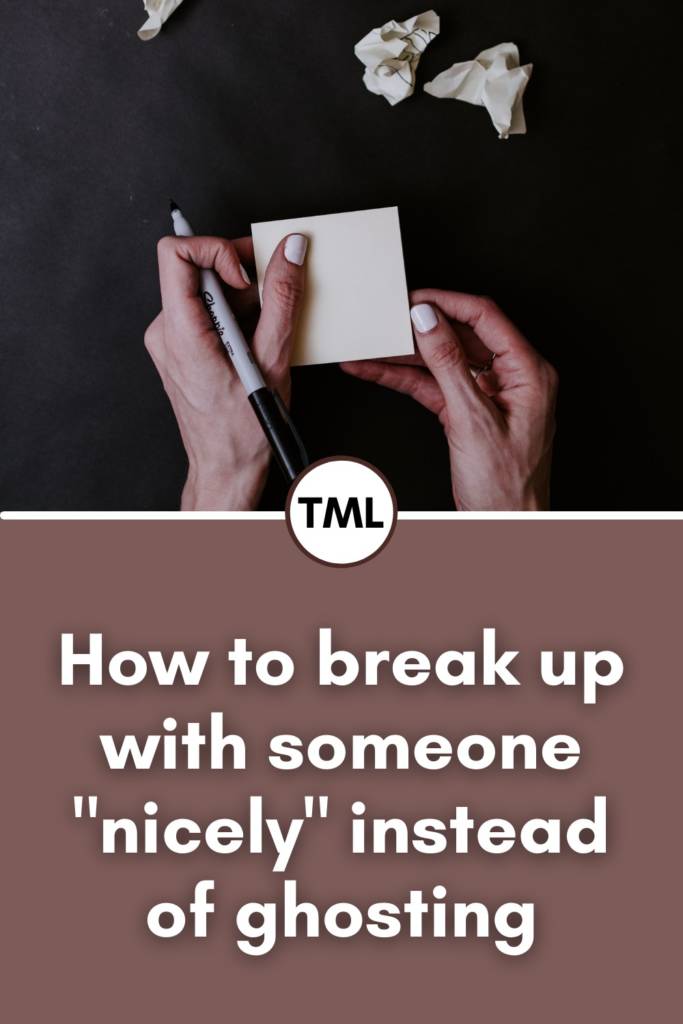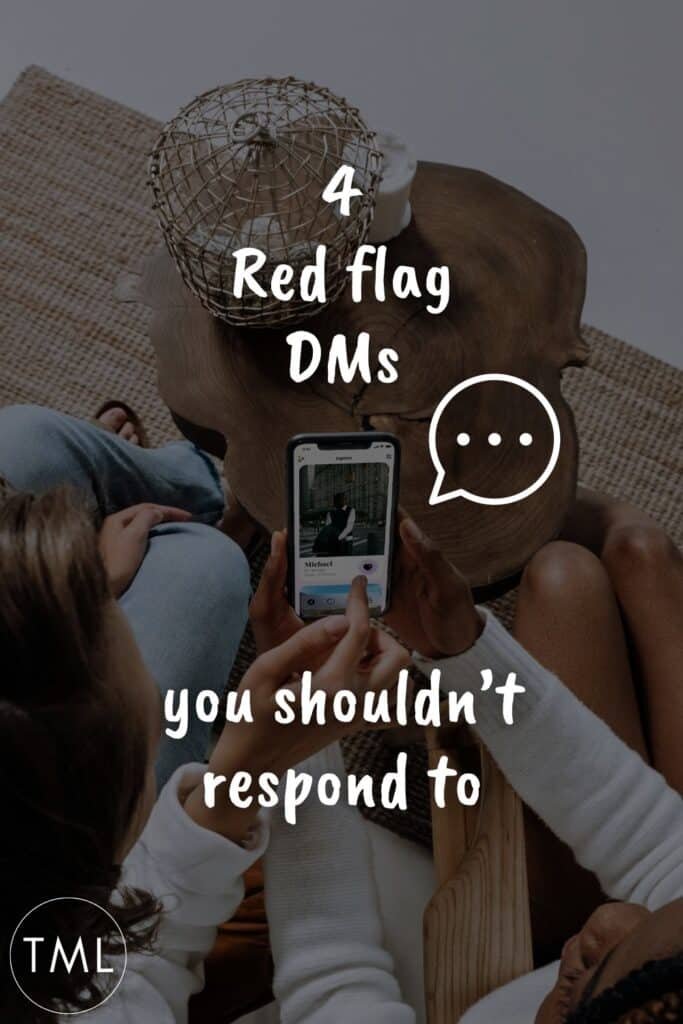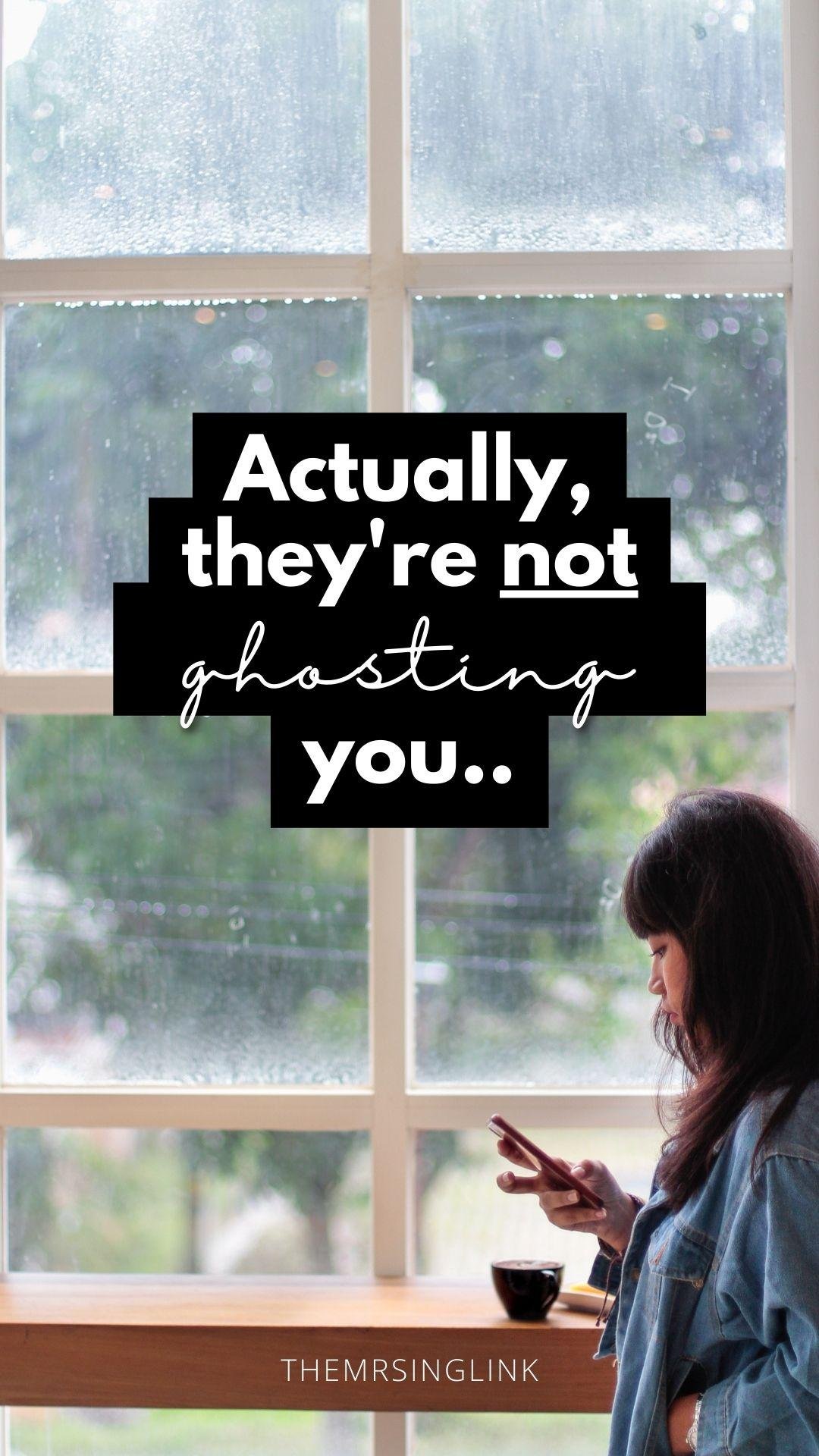Is he ghosting you, or is he just not interested?
Too often a label gets slapped on someone simply because we don’t like their behavior. The term ghosting in dating is one of them when, actually, he’s not ghosting you at all.
I realize I’m stepping on hot coals and that even the title of this post is likely to jolt the frustrated and disheartened when it comes to a common dating struggle of our more recent generations.
From personal experience in the dating world (and online dating realm), I had my own run-in with what would be classified as ghosting today and also being accused of ghosting.
In fact, many would say I ghosted my husband when I first met him online! I didn’t reply back after a handful of exchanged messages because he repeatedly put the conversation to death with dead end statements. Months later he replied, again – with a question this time – asking me, “Are you alive?” And the rest has been history now 10 married years later.
I am not, in any way, condoning poor behavior, therefore I do not approve of ghosting as a way to end a relationship or cease a connection (*yes, aside from the sometimes extreme and necessary circumstances).
And from this post I am not, by any means, justifying the true nature and malicious intent behind ghosting. But let’s remember, by definition, what ghosting actually is:
It is the calculated ending of a mutually invested, intimate relationship or connection with someone by suddenly, and without explanation, withdrawing from all communication and ceasing interaction altogether.
*Exhale*
First, we have to consider what dating means when many tend to treat it like relationships. FYI – it’s not. I don’t know about you but, for me, dating does not mean commitment or exclusivity, nor does it guarantee mutual connection or investment.
I will hold the hand of today’s dating culture when I say this…but ghosting is just another coined term for rejection (disinterest). Nothing more. And yet we’re classifying it as if it’s this catastrophic phenomenon.
The thing is, ghosting behavior has always existed – the behavior actually isn’t anything new. The term came to fruition, and its popularity of use when the behavior was exhibited in committed [exclusive], long-term relationships. For instance, when someone up and leaves their partner of four years without a warning or trace – like, *poof*, they’re gone and never seen or heard from again.
But now it’s use is being concentrated in the dating pool.

I really don’t want to be the one to say this but I feel the ghosting label is widespread because people [1] are hyper-sensitive to rejection, [2] apply their feelings from rejection to define someone’s character, and [3] assume mutual investment within a “contract-less”, non-exclusive and non-committal dynamic.
Again, I’m not condoning ghosting behavior, but we need to better understand both sides to this problem as we are increasingly throwing around the word like vomit.
What we unpack in this post..
Nonetheless, it definitely sucks to feel played and betrayed by someone who you felt had potential after two weeks of knowing them or after getting up close and intimate fairly early on. Hookup culture doesn’t help this ghosting epidemic, either.
Why else would society initiate dating as that buffer between singlehood and commitment if it weren’t for the sake of no strings attached? Nowadays you can be “ghosted” by someone after one date, or from solely exchanging romantic texts with for a short period of time.
With online dating as now an alternative source for finding a romantic connection, we act like we’re not ghosting the very people who slide into our messages yet leave them on read because we simply don’t like what we see in their pictures or read on their profile. We have to be willing to draw the line somewhere without blanketly claiming disinterest as ghosting when it’s not.

Unfortunately, when technology has made it a lot easier to seek, initiate, and make connections with others, it has also made it a lot easier to throw them away, pretend they don’t exist and move on to the next without having to consider or regard the other person’s feelings.
So what changed? Back then (pre social media, texting, cell phone, and even internet era) we weren’t always in constant contact with people. We also didn’t necessarily have the means to be connected to someone (everyone) anywhere, anytime.
But thanks to easy and demanding access to technology at our fingertips at all times, and through multiple avenues, we are consumed by the notion that we are entitled to zero-excuse, 24/7 access to other people’s presence, availability, time, effort and energy. Moreover, that our feelings must be regarded tenfold on all fronts.
Honestly, it’s no wonder everyone is let down easily and so disappointed by everyone all the time. Dating in itself is no longer an anticipated pleasure, but an ever-growing pain in the a**. Its value has obviously heavily depreciated, yet we aren’t rebuking or leaning away from it.
*Phew*, and I haven’t even gotten to the good parts of this post. Please, bear with me.
With that said, I find the term ghosting in dating has become a default label replacement for passive disinterest and is being misused as a way to avoid dealing with our personal triggers (of rejection). So, listen up, because if you’re dating someone, they may not actually be ghosting you.
Actually, he’s not ghosting you (7 Signs)

*As always, the thoughts, opinions and beliefs throughout this post are entirely my own.
They had to address and press a violated boundary
Aside from the fact we are all likely to cross over some lines in the sand with others, even though we mean well, it may be hard of hearing or strike a nerve when someone you like calls you out on something and puts their foot down. Or, in the case of ghosting, they sweep you under the rug.
LBR, especially when that someone is a fresh, romantic interest, but we must acknowledge that individual preferences, limitations, deal breakers, and dating boundaries do exist.
By calling you out and putting their foot down, this may be on something seemingly not-a-big-deal *to you*. I’ll even say this, yet dance around it very lightly, certain boundaries, preferences, limitations and even deal breakers may not bear as much weight (or exist at all) if they actually liked you. Don’t shoot the messenger, but we can’t deny this.
When our preferences aren’t met, limitations are exceeded, deal breakers pop up, and boundaries are over-stepped, things change. Feelings change, and rather quickly, might I add.
So, when you “overstepped”, say, by befriending and reaching out to their friends and siblings on Facebook after Date #1 (whom you’ve yet to be properly introduced to), or when you showed up at their place unannounced (after having slept there for the first time the night prior), this may be unapologetically normal and acceptable behavior to you.
Except it may not be for them, especially when feelings are fragile, wobbly or slow-paced early on. This can give them a lackluster impression and leave a bad taste in the mouth. For them it’s giving red flag vibes.
Therefore, if they did – in some fashion – address something they weren’t fond over, had to reinforce a boundary (especially more than once), to which you received personally or failed to respect, and they went no contact…they’re not ghosting you.
And that’s just it – there have definitely been situations where someone pushed my limitations, overstepped my boundaries (i.e., dating red flags) or behaved in a way that grossly altered my feelings for them (very quickly) and that sabotaged my interest in them. We can’t act like this isn’t uncommon.
In the end, and people just won’t like hearing it, but there are certainly times when salvaging surface-level feelings for someone we hardly know so early on in dating simply aren’t worth exerting extra effort or an explanation.

They spelled out their need for space
When I was dating, as an adult seeking a relationship, I still valued my space and personal time. Again, and here’s the kicker, if I was truly, truly interested in someone I was naturally inclined to less space and personal time. Yet I was still capable of declining a date (with someone I liked) simply out of preference for a self-care night to myself.
BUT, if I really had to spell this one out for someone, I was usually left feeling obligated to sacrifice my personal space and time. They would even sometimes say things to make me feel guilty about it – ew. I’ll just leave that one there and revert back to Point #1.
Bottom line is, space in relationships [on some level] is crucial. Yet we typically believe someone we’re dating who wants space is uninterested – tell me I’m wrong.
Again, as someone who programmatically requires personal time to recharge, when I was really interested in someone I actually wanted to spend as much time with them as I was able. Even if that meant burn out – FYI, also isn’t healthy.
That being said, getting to know someone doesn’t equate to this anticipated entitlement of their sole interest, feelings (for you), devotion, priority and time.
If someone you’re dating or just started dating has asked for space or *had to* demand it and, as a result, disappeared from the radar, that’s an indication that their feelings for you are not in alignment with yours for them.
And I’m sorry but this does not mean he’s ghosting you if he’s told you what he needs, and that being space or separation from you.

They’ve made their intentions known and clear
Let’s talk casual. You know, you’re with someone who strictly told you that they want to keep things light, free, and open. Casual. Anything that spells *they just want to have fun* with zero strings, go with the flow, no commitments and can cancel their membership anytime (no fees and restrictions apply).
Maybe that’s you, too – you also just want casual.
Dating in and of itself is strictly casual. It doesn’t give people a free pass to be butthole human beings, but dating says, “Hey, if I don’t like you, no hard feelings, okay?” Dating means no one is tied to another, though we have the most difficult time understanding and accepting that.
Casual is why dating exists in the first place, because its self-focused at its core since the goal is to keep options open while getting to know someone. Dating is selfish – there, I said it, since many won’t and aren’t going to admit it.
[Related Read: Thanks to Hookup Culture, dating is now ruined]
Dating exists because people didn’t want to be “tied down” and committed to just one person, they wanted options with an easy “out” without all the emotional investment or chaos, nor did they want to be in anyone’s debt since dating was designed for ease and convenience. Nobody said dating was the perfect dynamic for everyone, and many will even go as far as to abuse it.
Then it is also safe to say that if someone you’re just dating has made their casual intentions clear (and have not given you any inclination that says otherwise) then it is already established that they are not bound to you. Meaning they do not have to inform you if, when, how, or why it comes to an end (between you).
Granted, the whole entirety of ghosting is that people expect this standard of mannerisms when it comes to dating. Good people will, at the very least, leave you with a, “Hey, good times, good fun, you’re cool and all, but I’m not into it anymore. Later – peace. Best of luck.“
That’s what we expect, or otherwise people are now labeled negatively, but the reality is we won’t always get that response, especially when people are dating other people frivolously.
Remember, if you’re leaving people on Read in your DMs…that would mean you’re ghosting them, too, because you’re not up front with your intentions or being considerate of their feelings.

I digress. Now it seems people blame vague, misleading, or indirect wording or false validation for steering them into believing feelings were mutual. IMO, people want a sweetened let down, yet that often leads to more confusion, and ultimately ends in rejection, anyway.
The thing is if the answer is not a hard Yes, it’s a No. So why are we assigning potential value to the things we shouldn’t? For example:
- When you ask someone if they’re looking for a relationship and their response deflects or aims to dodge an affirmative Yes, like, “If the right person comes along at the right time,” or “I don’t like to put that kind of pressure on things when you’re getting to know someone.” This is their way of going with the flow and seeking an “out” for when/if something better comes along or in order to leave the door open to simply dip.
- You notice they are treating you differently after you’ve been intimate, or because you’ve been intimate you experience failed anticipation that their feelings for you would grow exponentially and that their affection for you would show or increase. Unfortunately… sex in dating is not an indication, agreement, or confirmation of someone’s feelings, investment, intention, commitment or respect for you.
- They tell you (or even show you) they are invested in you but have never actually reinforced that it’s only you. They do this slyly by making you aware of how important/special you are (even by way of Love-bombing) and then counteracting with grossly specific red flags. There’s this distinct hot and cold behavior going on, because maintaining a level of uncertainty creates this falsified chemistry without genuine, evidential investment.
Unfortunately, the whole casual-ness aspect in dating can get a bit blurry (rightfully so if you’re not dating for exclusivity). It is that much more important to talk about and stand up for your end-goals or dating intentions upfront, which still comes with the risk of rejection and disappointment.
But if you agree to or consent to something strictly casual and they have made their casual intentions (whether by word or action) known and clear…they’re not ghosting you when they casually decide to move on to wherever the wind blows them next.
You’re not satisfied with what [answer, closure] they’ve given you
Fact: nobody owes you anything – not even an explanation. Reiterating my point from above when I said people basically expect an Exit statement but can’t accept that they may not always get one.
You also may not like the answer or closure you get.
Say you’ve been on a handful of dates with someone, and it’s going so well in your eyes, but maybe you’re unsure on their end. Uncertainty is the red flag here, and maybe it’s pretty evident, so it’s a lot like waiting for the other shoe to drop. Meanwhile, you continue to give this person the benefit of the doubt (over and over) or willfully choose to ignore clear signs of disinterest (even if they’re passive).
From my dating generation, as a Millennial, it wasn’t ghosting if someone dwindled from the limelight – as in they stopped calling and texting, made excuses for not getting together, consistently cancelled plans, completely went MIA and was never to be seen or heard from again.
It simply meant they weren’t or were no longer interested. We didn’t call it anything else – we took it at face value and moved on. There really was no need for a formal Exit interview or two-week notice. Besides, no answer is still an answer, whether it’s the one we want and expect or not.

Again, this pertains to dating, not exclusively committed relationships. The term only first appeared as to describe relationships where one partner disappeared and left the relationship without a trace (reason, closure, or answer).
We can claim immaturity and lack of human decency all we want, but time and time again we are told by professionals that we are also allowed to change our minds and walk away, without explanation, even if that means without a word or going no contact. For instance,
- No longer entertaining drama/gossip or engaging with a friend who said things about you behind your back.
- Not responding to [flirtatious/forward] DMs, texts, or phone calls from those attempting to “pursue” you who you’re not interested in.
- Deleting/blocking accounts/individuals (on social media) that do not or no longer serve you or “spark joy” in your life.
- Going “no contact” with family members or ex-partners who are not or no longer a positive influence, support system or role model in your life.
- Declining or not responding to an offer or invitation with or without reason.
Granted, that doesn’t make ghosting behavior okay or acceptable, but I think ghosting in the dating realm only serves to highlight answers we’re simply not satisfied with or willing to accept. For example, in dating:
- When their effort starts to fizzle or their behavior goes hot and cold; the frequency and quality of their texts or phone calls, and their efforts to initiate, make and commit to plans dwindle. This has always been called Bread-crumbing of disinterest, not ghosting.
- When they are wishy-washy about their feelings for you; one minute they show you they like you and then you’re doubting it the next. They can’t be up front and honest with how they feel about you or they only tell you what you want to hear (not on their own accord). This has always been known as emotional unavailability, not ghosting.
- When they refuse or fail to prioritize and consider your time, energy and effort; you continue to prioritize your energy, effort and time into them while tolerating low-quality behaviors or even maltreatment. Evidential disinterest (and disrespect) isn’t considered ghosting when you can smell death from a mile away!
- When they fail to or wrongly acknowledge your innate value; they refuse to show up because they’re more focused on what you bring to the table. How can this even remotely be considered ghosting when it’s clear that their feelings for you are based on what you can offer them?
Remember, poor, undesirable behavior and maltreatment is also an answer. No answer is also an answer…it’s not always ghosting. It just may not be the answer or confirmation we like or expect.

They made a claim or promise without the evidence to back it up
So they told you things like, “I really like you,“, “I really want to see you again,“, “I see myself with you,” or “I only have eyes for you.” The thing is, do we understand what a false claim is in the dating world?
He says he really likes you, but that isn’t backed up when he only calls/texts sparingly with vague, one-word answers. He says he wants to see you and that he’s serious, but that isn’t backed up when every weekend is another excuse for why he’s going out with the boys instead.
He says he sees himself with you, but that isn’t backed up when he’s being tagged in posts with other random women. He says he only has eyes for you, but that isn’t being backed up when he follows, Likes and interacts with female models, influencers and other random women on his socials.
Ghosting occurs when there is no real evidential awareness, previous knowledge or anticipation, whereas him making false claims and promises to you is him telling you without telling you where his head and heart are at.
He’s not ghosting you, he’s indirectly displaying or backdoor foreshadowing his intent. Unfortunately, leading you astray is simply the by-product of believing and relying on false claims to begin with.

He can’t ghost you if he wasn’t once alive
You know, a dead person was once alive, right? Well, if he’s a ghost it was because he was once alive. If he ghosts you, it was because there was once life (something real and alive) between you.
Am I starting to make sense here?
What does that look like? I mean, if I’m going to define life between you I’m going to call it a shared foundation – a substantial connection you built together. Or a promise you both made, agreement you shared, an account you both invested in, a bond you each nurtured, etc. etc..
It was something made up of more than just surface-level *feelings* and some fun nights out getting to know each other. It’s more than just casual intimacy.
Does this necessarily mean you have to be in a relationship, per say? Not exactly, there are those who just date someone for a very long time (for months or years, even). Basically, for something to suddenly die (disappear, vanish) it has to have once been real or living.
They never actually initiated or insinuated interest in the first place
Now I understand this one can be a little confusing, because why would someone play house if they weren’t at all interested in buying? The people to have ghosted are predominantly those who, at one point, seem or appear interested, right? Or, at the very least, they’re receptive to another’s interest (in them).
I think there are some pretty simple explanations to consider.
- People like to talk. Whether they’re interested romantically, find you interesting or not. We can’t act like it’s impossible to [want to] interact with someone solely out of the desire to conversate if for no further reason.
The same reason we can’t assume that just because a stranger converses with you they suddenly and automatically want to be your friend.
This includes people dating online – there’s plenty of people on there who are simply seeing what it’s about, seeing what kind of people are on there, and if any possibilities ring to be true – nothing more. - People like the attention. Hello, there are those who will nurse the bottle they’re being fed even if they won’t go back for seconds. Let’s not pretend the flattery isn’t nice to enjoy without further motives, reciprocation or returning the favor.
- Ladies, there are far and FEW reasons guys will turn down an opportunity. When I say guys will shoot their shot or take the win being handed to them, I mean it, regardless of their intention.
We really can’t take every single act or word as assumed interest. Receptivity does not mean guaranteed interest, either. So when he says, “If I wasn’t interested, I wouldn’t have replied back,” we really shouldn’t automatically assign that as gospel. It’s a mere steppingstone, not absolute confirmation.
As difficult as it may be, ladies, we’re really good at taking a, “I had a really good time tonight,” as to mean, “I want to marry you.” So no wonder it burns like hell when a guy says that to ultimately never get back with you about a following date.
Fact of the matter is, the wordage is nice and all but that alone doesn’t affirm interest. He could have legitimately had a good time…when that may be totally true, but that simply be it.
We already say it enough, “They wouldn’t [reach out, ask for your number, set up a date to meet, call you the next day, text you goodnight, etc.] if they weren’t interested,“…but we really have to be careful that we aren’t labeling everything as interest or blowing things up bigger than they are, especially right off the bat.
Interest is genuine when it is built and earned, not paid. Meaning, interest isn’t based on singular words or actions, it’s a cumulative foundation. That doesn’t mean we go on claiming everything as disinterest or deceptive interest, either. A person’s true intentions are exhibited over time, consistently. Yet we tend to fall for the trickery in that a simple text response equates to the value of I Love You.
So even if he asked for your number, that doesn’t insinuate genuine interest if he never calls. You literally can’t ghost something that never was or that you didn’t have in the first place (which is cumulative proof).


